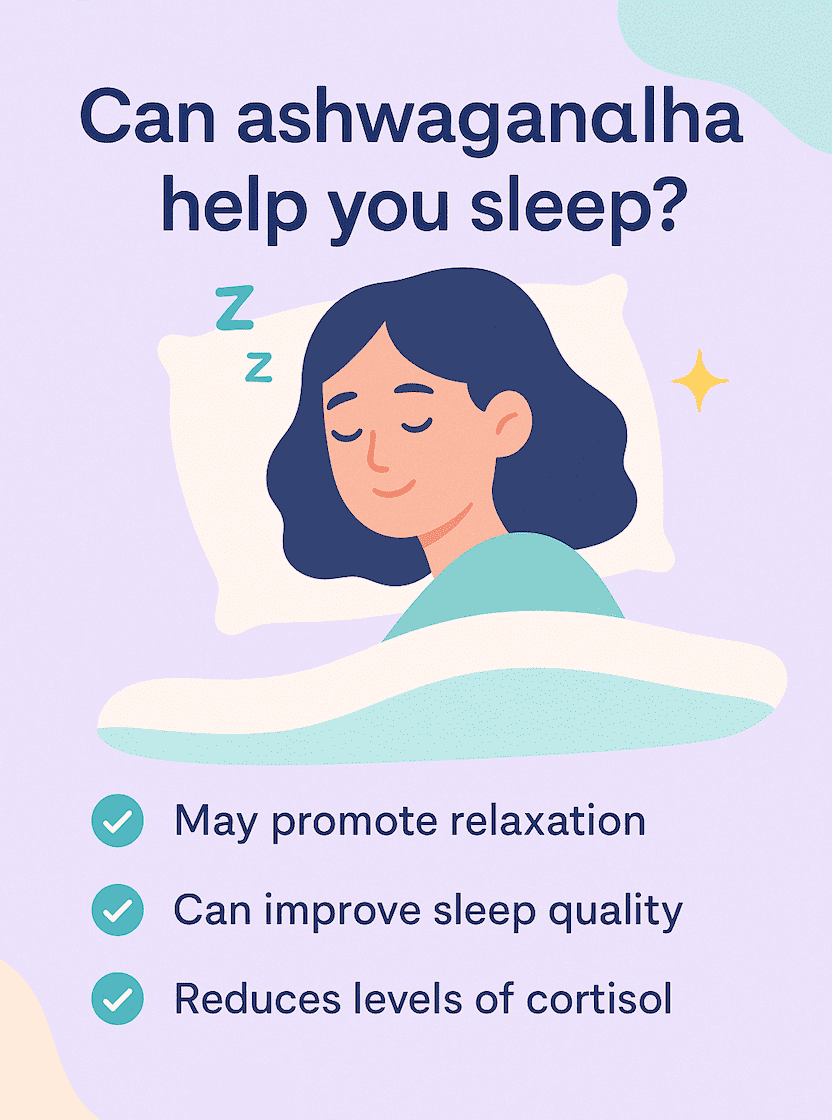Last update: November 6, 2025
6 minute read
Can Ashwagandha Help You Sleep? What Studies Show
Uncover the science behind this ancient adaptogen, how it might soothe your nights, and what the research really says.

By Derick Rodriguez, Associate Editor
Edited by Dr. Dimitar Marinov, MD, RDN, PhD

It’s a familiar cycle: you crawl into bed, exhausted but restless, only to spend hours staring at the ceiling. Sleep can feel elusive, and the more you try to force it, the harder it seems to come. In a world where over 30% of adults report sleeping less than seven hours a night, the search for natural solutions is stronger than ever.
Enter ashwagandha, a plant rooted in centuries of traditional medicine and now making waves in modern wellness. Could this herb really help you fall asleep faster, sleep deeper, and wake up refreshed?
This article breaks down what ashwagandha is, how it might support sleep, the latest research findings, safe ways to use it, and who should avoid it.
Key takeaways
- Ashwagandha may improve sleep quality by reducing stress, lowering cortisol, and interacting with calming brain pathways
- Clinical studies show benefits at 300–600 mg/day of standardized extract, with stronger effects after 8–12 weeks of consistent use
- Powders, capsules, tinctures, teas, and gummies all exist, but standardized, third-party tested extracts are most reliable
What is ashwagandha?
Ashwagandha (Withania somnifera) is a perennial shrub native to India, Africa, and parts of the Middle East. Its name comes from Sanskrit: “ashwa” (horse) and “gandha” (smell), reflecting its pungent roots. Its Latin species name, somnifera, literally translates to “sleep-inducing.”
Traditionally, ashwagandha has been used in Ayurvedic medicine for thousands of years as a tonic to restore balance, ease stress, and support vitality. Today, it’s classified as an adaptogen, a substance believed to help the body adapt to stress and promote resilience.
Traditional and modern uses
In Ayurveda
- Calm the nervous system
- Reduce anxiety and insomnia
- Build vitality and stamina
In modern wellness
Research now extends beyond stress relief and sleep:
- Boosting athletic performance (better strength and oxygen use)
- Enhancing memory and focus
- Supporting fertility and testosterone levels in men
- Improving thyroid function in some cases
These broader benefits reinforce why ashwagandha is increasingly popular among athletes, students, and stressed professionals alike.

Science-backed benefits: What do studies show?
1. Improved sleep quality and duration
A 2021 systematic review and meta-analysis of five randomized controlled trials (about 400 participants) found that ashwagandha significantly improved overall sleep among adults, especially in those with insomnia, when taken at doses of ≥600 mg/day for ≥8 weeks.
2. Shorter sleep onset latency
In a 10-week randomized, double-blind, placebo-controlled study using a root extract (often KSM-66), participants fell asleep more quickly than those on placebo.
3. Greater sleep efficiency & better morning alertness
Same study and others showed improvements in sleep efficiency (more of your time in bed is actual rest), total sleep time, and mental alertness upon waking.
4. Reduced stress, anxiety, and cortisol
Part of ashwagandha’s benefit seems to come from its stress-lowering effects. Studies show it reduces perceived stress and cortisol, which can relieve a major barrier to good sleep.
How it works: The science of sleep support
- Withanolides: Bioactive compounds with antioxidant and anti-inflammatory effects that may calm the nervous system.
- Cortisol regulation: Helps balance the stress response via the HPA axis.
- Neurochemical impact: Modulates GABA and serotonin pathways, promoting relaxation and sleep readiness.
— Dr. Dimitar Marinov, MD, RDN, PhDAshwagandha has earned its reputation in recent years for its calming and restorative properties. But what’s important to remember is that these effects are gradual, appearing after weeks of consistent use rather than overnight. Just as with any supplement, quality and dosing matter, and Ashwagandha works best when combined with good sleep hygiene rather than replacing it.
Types of ashwagandha & how to use it
Ashwagandha comes in many forms, each with its pros and cons:
Form | Pros | Cons |
|---|---|---|
Capsules/Tablets | Convenient, standardized dosing | Must swallow with water |
Powder | Mix into smoothies or warm milk (“moon milk”) | Taste can be bitter |
Tinctures | Fast absorption | Alcohol-based extracts may not suit everyone |
Teas | Gentle, ritualistic bedtime use | Lower potency |
Gummies | Easy, tasty | May contain added sugars |
Dosage
- Typical range: 300–600 mg/day standardized extract
- Some studies: up to 1,000 mg/day safely for 12 weeks
- Effects usually appear after 6–10 weeks of consistent use
VitaRx Tip
Always check product labels for withanolide content (ideally 5% or higher) and look for third-party testing (USP, ConsumerLab).
Safety, side effects, and who should avoid it
Generally well tolerated (short-term)
- Mild nausea, stomach upset, or drowsiness
- Safe for most adults up to 3 months
Risks & interactions
- Pregnancy/Breastfeeding: Not considered safe
- Liver injury: Rare, but reported
- Hormonal effects: Can raise testosterone and affect thyroid hormones
- Medication interactions: May interfere with blood pressure, diabetes, thyroid, seizure, sedative, or immunosuppressive drugs
Don’t combine with:
- Valerian, kava, hops, L-tryptophan, or melatonin
- Combining can cause excessive drowsiness or slowed breathing

Get your personalized vitamin recommendations in less than 3 minutes.
Get your personalized vitamin recommendations in less than 3 minutes.

Other ways to improve sleep naturally
Even if ashwagandha helps, it works best when paired with good sleep hygiene. Try these habits:
- Go to bed and wake up at consistent times, even on weekends
- Keep your bedroom cool, dark, and quiet (60–69°F is ideal)
- Limit screens and bright light 30-60 minutes before bed
- Use your bed only for sleep and intimacy
- Establish a calming routine (light stretching, reading, herbal tea)
Frequently asked questions (FAQ)
Here are some of the most frequently asked questions about ashwagandha and sleep.
Final thoughts
Ashwagandha isn’t a magic bullet, but research suggests it may be a gentle, effective way to support better sleep, especially if stress or racing thoughts are keeping you awake. When paired with good sleep hygiene, it may help you fall asleep faster, stay asleep longer, and wake up clearer-headed.
That said, it’s not for everyone, and supplement quality matters. Always consult your healthcare provider before starting, particularly if you’re pregnant, managing a chronic condition, or taking other medications.
Curious if ashwagandha or other supplements fit into your routine? Take our free health quiz to explore personalized wellness solutions tailored to your lifestyle and goals.
Sources and references
- Effect of Ashwagandha (Withania somnifera) extract on sleep: A systematic review and meta-analysis | PLOS One
- A randomized, double blind, placebo controlled study to evaluate the effects of ashwagandha (Withania somnifera) extract on sleep quality in healthy adults - PubMed
- Ashwagandha: Is it helpful for stress, anxiety, or sleep? - Health Professional Fact Sheet
- Efficacy and Safety of Ashwagandha (Withania somnifera) Root Extract in Insomnia and Anxiety: A Double-blind, Randomized, Placebo-controlled Study - PMC
Editor

Derick Rodriguez
Derick Rodriguez focuses on editing health and wellness-related content. With over half a decade of experience in the digital realm, Derick has developed a unique skill set that bridges the gap between complex health concepts and accessible, user-friendly communication. His approach is deeply rooted in leveraging personal experiences and insights to illuminate the nuances of health and wellness topics, making them more approachable and empowering readers with knowledge and confidence.
Fact checker

Dr. Dimitar Marinov
Dr. Marinov has years of experience in scientific research and preventive and clinical medicine. His publications in peer-reviewed journals are on nutritional status, physical activity, and musculoskeletal disorders among adolescents.
At VitaRx, we're not just passionate about our work — we take immense pride in it. Our dedicated team of writers diligently follows strict editorial standards, ensuring that every piece of content we publish is accurate, current, and highly valuable. We don't just strive for quality; we aim for excellence.
Related posts
While you're at it, here are some other relevant articles you might be interested in.

Get your personalized vitamin recommendations in less than
5 minutes.
Get your personalized vitamin recommendations in less than
5 minutes.






